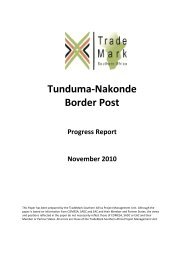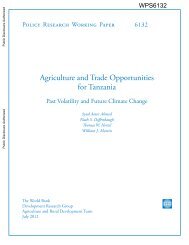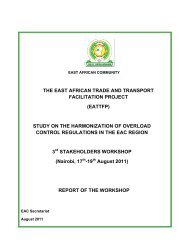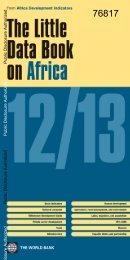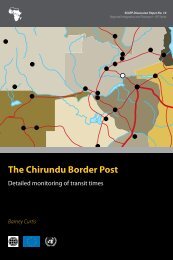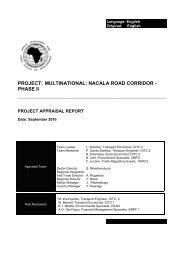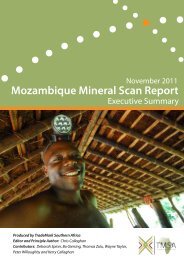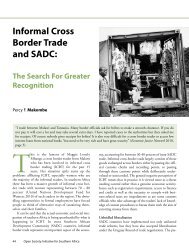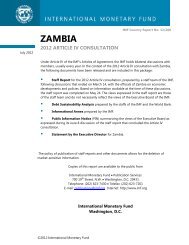Plant Health, Climate Change and Trade - TradeMark Southern Africa
Plant Health, Climate Change and Trade - TradeMark Southern Africa
Plant Health, Climate Change and Trade - TradeMark Southern Africa
You also want an ePaper? Increase the reach of your titles
YUMPU automatically turns print PDFs into web optimized ePapers that Google loves.
12 <br />
6.8. Focusing on Interdisciplinary approaches<br />
Environmental health, human, animal <strong>and</strong> plant health <strong>and</strong> food safety are interrelated, <strong>and</strong><br />
connected to other global change factors such as globalization <strong>and</strong> technological changes.<br />
The "One World One <strong>Health</strong>'' model as described by the Wildlife Conservation Society<br />
(WCS) provides a framework for a more coordinated <strong>and</strong> holistic approach.<br />
Interagency coordination <strong>and</strong> collaboration in countries should be enhanced e.g. through<br />
joint research, investigation of risks, training, etc. to ensure efficient control efforts.<br />
6.9. Mainstreaming adaptation in development cooperation <strong>and</strong> SPS capacity building.<br />
Ministers responsible for Agriculture <strong>and</strong> representatives of Countries present at the <strong>Africa</strong>n<br />
Ministerial Conference on <strong>Climate</strong>–Smart Agriculture “<strong>Africa</strong>: A Call to Action" , called on the<br />
<strong>Africa</strong>n Union <strong>and</strong> other partners to mainstream climate change principles into the<br />
Comprehensive <strong>Africa</strong>n Agricultural Development Programme (CAADP) <strong>and</strong> to further<br />
support the implementation of the AUC-‐NEPAD Agriculture <strong>and</strong> <strong>Climate</strong> <strong>Change</strong> Adaptation-‐<br />
Mitigation Framework.<br />
The World Bank's World Development report 2010 focused on the impact of climate change<br />
on development. The report states that poverty reduction <strong>and</strong> sustainable development<br />
remains core global priorities but climate change must be addressed as it threatens<br />
development goals with most impact on poor countries <strong>and</strong> poor people. The reports urges<br />
countries to act now <strong>and</strong> act together <strong>and</strong> to adapt development policies that are climate<br />
sensitive <strong>and</strong> not postpone mitigation in developing countries as such approaches could<br />
double mitigation costs later. Early action is therefore needed to identify <strong>and</strong> scale up best <br />
practice for climate-‐smart agriculture, to build capacity <strong>and</strong> experience, <strong>and</strong> to help clarify <br />
future choices.<br />
A study done by the World Bank in Mozambique found that integrating adaptation measures<br />
across all sectors <strong>and</strong> institutional levels is important to safeguard existing <strong>and</strong> future<br />
development progress in light of climate change. The study identified organisational barriers<br />
<strong>and</strong> opportunities for mainstreaming adaptation into development assistance. It states that<br />
government plays an important role to improve institutional coordination <strong>and</strong> integration of<br />
cross-cutting issues, including phytosanitary concerns <strong>and</strong> food security, into development<br />
planning. However, specialists in environmental units across all relevant sector institutions<br />
are needed to identify <strong>and</strong> develop adaptation strategies <strong>and</strong> to strengthen organisational<br />
capacity to address climate change risks <strong>and</strong> improve the network for awareness.<br />
Mainstreaming adaptation in development cooperation <strong>and</strong> phytosanitary capacity building<br />
will require efforts to raise awareness about the implications of climate change for SPS risks,<br />
<strong>and</strong> the benefits of SPS capacity building for adaptation as well as trade <strong>and</strong> development.<br />
6.10. Forming public-private partnerships <strong>and</strong> the role of the public sector<br />
Institutional weaknesses of the National <strong>Plant</strong> Protection Organisations (NPPO's) in<br />
developing <strong>and</strong> least developed countries were explicitly recognized during the incorporation<br />
of the World <strong>Trade</strong> Organization's Agreement on Sanitary <strong>and</strong> Phytosanitary Measures into<br />
COP 17 -‐ <strong>Trade</strong>mark <strong>Climate</strong> change impact on phytosanitary risks



